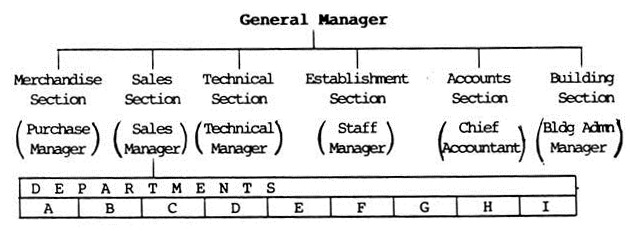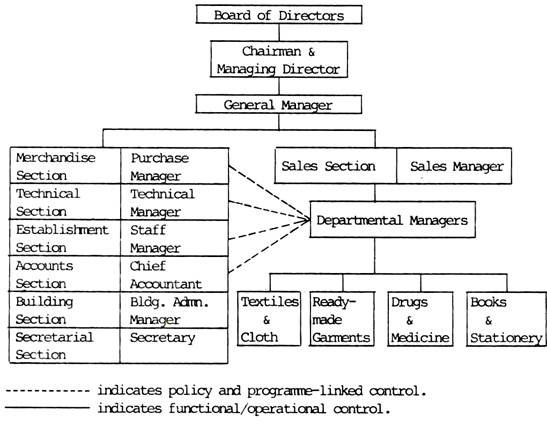In this essay we will discuss about:- 1. Meaning of a Departmental Store 2. Features of Departmental Stores 3. Essential Conditions 4. Organisation Structure 5. Advantages 6. Disadvantages.
Essay on Departmental Store
Essay Contents:
- Essay on the Meaning of a Departmental Store
- Essay on the Features of Departmental Stores
- Essay on the Essential Conditions for Success in Departmental Stores
- Essay on the Organisation Structure of a Departmental Store
- Essay on the Advantages of Departmental Stores
- Essay on the Disadvantages of Departmental Stores
Essay # 1. Meaning of a Departmental Store:
ADVERTISEMENTS:
A departmental store is a large scale retail business institution having a number of departments, each specialising in one kind of merchandise and expected to show profit for the department while remaining as a component of the entire business unit. It is, in a technical sense, a horizontally integrated retail business house with all departments under one roof.
In it, each department is a speciality shop such as textile department, drugs department, books and stationery department, video cassette department, etc. A consumer can hope to get all that he needs in a big departmental store.
That is why, it is remarked that a big departmental, store is a place where different sections or departments deal in articles ranging from ‘pin to plane’. Such departmental stores are usually located in the central places of big cities.
Essay # 2. Features of Departmental Stores:
ADVERTISEMENTS:
The main features characteristics of a departmental store are:
1. It is mostly organised as a joint stock company. Its organisational head is the board of directors with a managing director or a general manager entrusted with the implementation and execution of the policies and programmes formulated by the board. The General Manager coordinates the activities of various departments as their overall chief.
2. It is generally divided into several major sections to facilitate smooth working of the stores.
The major sections in it are shown below in a chart:
3. As regards the day-to-day working, the departments enjoy independence and freedom but all are owned, managed and controlled centrally.
4. It concentrates in one place opportunities for the satisfaction of innumerable wants of the consumers.
5. Having been located in the central place or shopping centers of a city, a departmental store can attract people from all parts of the city and others who came to the city from outside.
Essay # 3. Essential Conditions for Success in Departmental Stores:
ADVERTISEMENTS:
(1) The organisational structure of a departmental stores must be sound enough to facilitate coordination among the departments.
(2) The departmental managers must be given due freedom with respect to their day-to-day activities.
(3) The policies and programmes for the management and control must be uniform for all departments.
(4) The shopping for the consumers, particularly housewives, should be easy through a provision of a whole range of goods belonging to different lines in the same building.
ADVERTISEMENTS:
(5) Certain services outside the scope of ordinary business such as car parking, cafeteria, telephone, recreational facilities, etc. should be provided to attract the customers.
Lastly, attractive show-windows, display of products, skilled salesmen, low operating costs, etc. are also the essential factors for the success of a departmental store.
Essay # 4. Organisation Structure of a Departmental Store:
Essay # 5. Advantages of Departmental Stores:
ADVERTISEMENTS:
As a form of large-scale retail business institution, the departmental store possesses the following advantages:
1. Economy in Purchases:
As regards the purchasing function, a departmental store plays the role of a wholesaler. It buys goods in bulk direct from the manufacturers, enjoys discounts and rebates and credit facilities, and thereby incurs lower freight charges. This centralised buying lowers down the unit cost prices of the goods. Employment of expert buyers for the departments is possible with a view to achieving economy.
ADVERTISEMENTS:
2. Effective Advertising:
Being large in size and having diversity in different lines of products and services, a departmental store can afford to advertise on a bigger scale through press and other media of publicity. It can also decorate its departments with attractive show-windows for display of goods with a view to attracting customers.
3. Increase in Sales Turnover:
Having been located in central positions and in popular shopping centers, people from all parts of the city and others who came to the city from outside patronise the departmental store. Moreover, the consumers can buy their requirements of varied kinds under one roof. These factors lead to increase in the sales turnover.
4. Non-Business Services:
A modern departmental store does not confine itself merely to the business activities concerning the products being dealt in through the departments. Various non-business services like car-parking, cafeteria, telephone and telex, and recreational facilities provide additional advantages and benefits which are of definite attraction to the customers.
ADVERTISEMENTS:
Essay # 6. Disadvantages of Departmental Stores:
Inspite of the above-stated advantages, a departmental store suffers from the following limitations or disadvantages:
1. Locational Unsuitability:
Due to expansion in the urban conglomeration, the limits of a city have widened. The centralised location of a departmental store becomes unsuitable to the vast majority of consumers who live at rather long distances from the central parts of the city.
ADVERTISEMENTS:
According to J. Stephenson, a departmental store can obtain the shopping trade by being centrally located but the trade in articles of everyday use, which are frequently wanted at short notices, goes to their smaller rivals who are located near the houses of their customers.
2. High Operating Costs:
High rental for the premises because of central location in a city, excessive and exotic non-business services (e.g. cafeteria, telephone, etc.) provided, high salaries and wages to the officials and staff, -higher costs of decoration and maintenance, etc. increase the burden of selling expenses.
These have great impact on the fixation of product selling prices on account of these cost factors, and a departmental store finds it difficult to sell the products at reasonable prices. Thus the customers are mostly restricted to the well-to-do sections of the society.
3. Lack of Personal Element:
Like small retail shops, a departmental store cannot attend to the customers’ needs and fancies as the customers are lost in the multitude that gathers in the store. The customers who are interested in personal attention by the salesmen do not prefer a departmental store and rather make their purchases from smaller retail stores.

